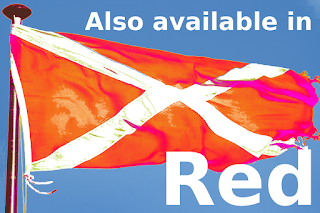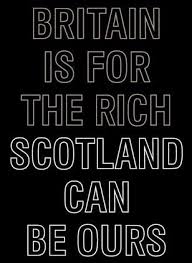Let's start this essay with a confession that I may have been badly wrong. I have been saying for some time that I did not believe that Nicola Sturgeon would actually call a second independence referendum; rather, that she'd use Westminster's expected rejection of an Article 30 order to indefinitely postpone one. Well, possibly, I was wrong. I hope I was wrong. Both The National and the SNP now say that Sturgeon will announce a concrete date for IndyRef 2, in 2020, at a rally in Glasgow on Saturday 2nd November.
So, good. Sometimes, it's nice to be wrong.
However, then we move onto the campaign. I expect the Scottish Government to produce a white paper, as they did in 2014, setting out a prospectus for independence. And I expect that prospectus to be, as it was in 2014, broadly a steady as she goes, don't rock the boat prospectus: a prospectus for a broadly technocratic, social democratic Scotland, more closely aligned to the interests of Andrew Wilson's clients than to those of the broad majority of Scots.
I do not believe the white paper was the critical vote winner in 2014. I think the broad vibrancy of the Yes campaign, the thousand flowers that bloomed, and in particular (for me, anyway; but I think for many others) the Radical Independence Campaign's slogan 'Britain is for the rich; Scotland can be ours' were more influential. Be that as it may...
Supposing there is a referendum, supposing Yes wins, supposing the UK government honours the result. There's a Holyrood election on 6 May 2021, which will undoubtedly happen before negotiations - with the UK, with the EU, with EFTA - are completed, and whose results will strongly influence the outcome of those elections.
If, as the SNP assumes - the SNP is elected to govern, especially if it is elected to govern with a majority - we will see an independent Scotland built in the image of that white paper: which is to say, not very different from the United Kingdom we are leaving.
The Queen will, almost certainly, be the head of state. Lords will still lord it over us. The land will still belong to the rich. Our system of democratic governance will remain highly centralised, with enormous, profesionalised 'local government' units administering territories each larger than one sixth of all independent countries in the world. The capitalist system will remain entrenched, owning most of the nation's industry and infrastructure. We'll even keep the pound - for the time being, at any rate - and that will prevent us rejoining the EU.
I don't believe that's the Scotland Scotland wants to be. I don't believe it's even the Scotland most members of the SNP want to see. Independence which changes nothing is worth nothing.
So what do we do about it?
Lesley Riddoch, at a fringe event of the SNP conference, suggested she'd start a new party to challenge the SNP from the decentralist left. She slightly rowed back from that in her column later that week, but the idea is a sound one. In order to challenge the SNP's corporatist, technocratic vision at the 2021 election, we will need a new party.
If it's a brand new party, of course, it's ridiculous to suppose that it can sweep to power in one bound. But that is not the point, as Lesley has said: the point is that the SNP is vulnerable from the left, and it knows it. The party has triangulated right so far and so fast in the past six years that it's left most of its members, let alone its supporters, behind.
A clear challenge from the left will push the SNP leftward. A strong challenge from localism should cause the SNP to at least reconsider its centralist bias.
The Holyrood electoral system - which I'm assuming we'll still use in 2021, since there is no current strong pressure to change it, and there isn't much time - gives space for small with broad support across Scotland. That 2021 government will be critical to the shape of Scotland for a generation at least, since it will supervise the process of agreeing a constitution. It is critically important to have influence in it.
A government of all the talents in which Lesley joined Andy Wightman, John Finnie, Maggie Chapman from the Greens, Tommy Sheppard, Alison Thewlis, Mhari Black, Mairi Gougeon, Jeanne Freeman and Mike Russell from the SNP would build a far more interesting Scotland than our current SNP cabinet.
And if we're to have such a party in place - if a new party is, indeed, needed, because it may be that what we should do is join the Greens - we can't wait, as Lesley suggested, until after independence. We need to start putting a platform together now. Yes, we can lift a great deal from work already done by Lesley herself, by Common Weal, Radical Independence and others, but we would need a clear, coherent platform, and that would need to be constructed.
I think it's time to party.
The fool on the hill by Simon Brooke is licensed under a Creative Commons Attribution-ShareAlike 3.0 Unported License

